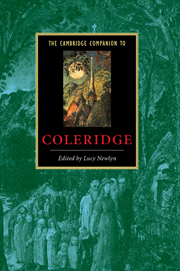3 - Slavery and superstition in the supernatural poems
from Part I - Texts and contexts
Published online by Cambridge University Press: 28 May 2006
Summary
At the end of 1797, Coleridge was in a quandary. He needed a new poetic language that readers would not find obscure. He wanted a new political discourse too, or at least a new analysis of politics, for events at home and in Europe left him isolated and disheartened, no longer able to believe that the millennium was at hand. In early 1798, France invaded free Switzerland. Coleridge saw this event as a final betrayal of the revolution of which he had hoped so much. It left him dispirited: the ideals of liberty, fraternity and equality had been perverted; France had become an imperialist military despotism. Already opposed to Britain's imperialist and despotic government, Coleridge was now alienated from his own nation and its revolutionary neighbour. And he was forced to ask why the population at large did not share his disgust. At home and abroad, the people were distressingly loyal to their warmongering governments. In 'France: An Ode', he recalled how Britons had been bewitched into bellicosity. 'Aslavish band', they did the bidding of a cruel monarch who bound them with 'a wizard's wand' (27, 29). The French had followed suit, abandoning their new-found liberty for slavish obedience to tyrants who acted in its name:
The Sensual and the Dark rebel in vain,
Slaves by their own compulsion! In mad game
They burst their manacles and wear the name
Of Freedom, graven on a heavier chain!
(85–8)- Type
- Chapter
- Information
- The Cambridge Companion to Coleridge , pp. 45 - 58Publisher: Cambridge University PressPrint publication year: 2002
- 9
- Cited by



